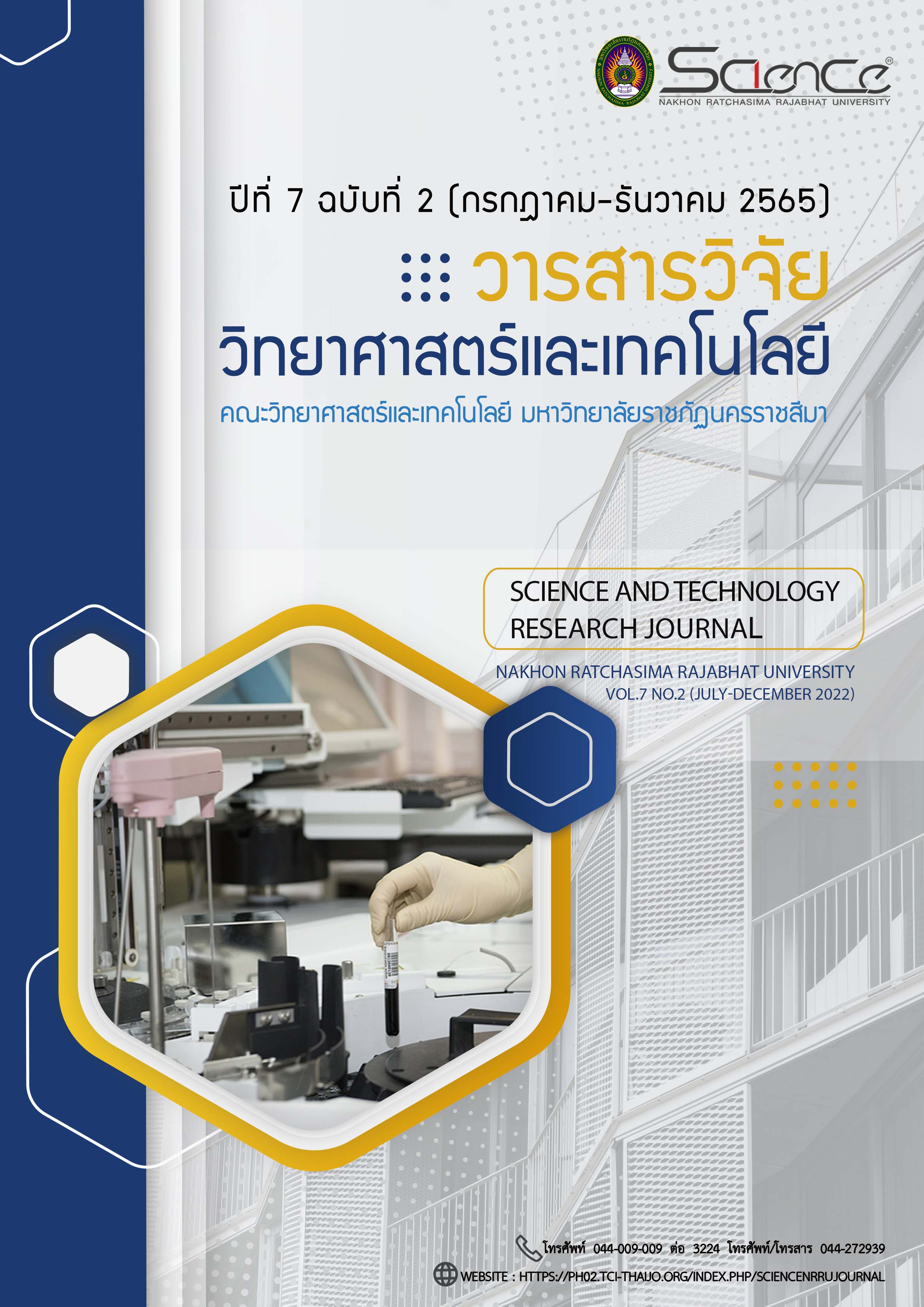การพัฒนาเกมด้านภาษา: เครื่องมือเสริมสำหรับการเรียนภาษาจีนกลางระดับประถมศึกษาปีที่ 1-3 ในยุควิถีใหม่
คำสำคัญ:
เกมด้านการศึกษา, เกมด้านภาษา, เครื่องมือเสริมสำหรับการเรียนภาษาจีนกลางบทคัดย่อ
งานวิจัยและพัฒนานี้มีวัตถุประสงค์เพื่อ 1) พัฒนาเกมเสริมทักษะภาษาจีนกลางที่ใช้เป็นเครื่องมือเสริมให้แก่ผู้สอนในการจัดการเรียน-การสอนภาษาจีนกลางระดับประถมศึกษาปีที่ 1-3 2) ประเมินความคิดเห็นของผู้สอนภาษาจีนกลางระดับประถมศึกษาปีที่ 1-3 ที่มีต่อเกม และ 3) ประเมินความพึงพอใจของผู้เรียนระดับประถมศึกษาปีที่ 1-3 ที่มีต่อเกม เครื่องมือที่ใช้ในการพัฒนาเกม ได้แก่ Unity 2019 และ MS Visual Studio 2019 (C#) กระบวนการในการพัฒนาเกมแบ่งเป็น 5 ระยะ ได้แก่ 1) ศึกษากลุ่มผู้ใช้และวิเคราะห์เนื้อหาบทเรียน 2) วิเคราะห์โครงสร้างและกลไกการดำเนินงานของเกม 3) ออกแบบเกม 4) พัฒนาและทดสอบเกม และ 5) ประเมินผลเกม ภายหลังการพัฒนาเกม ผู้สอนจำนวน 5 ราย ซึ่งเป็นกลุ่มตัวอย่างจากโรงเรียนเซนต์โยเซฟบางนาได้เข้าร่วมการทดสอบและประเมินผลการดำเนินงานของเกมผ่านการสัมภาษณ์กลุ่ม ผลการประเมินแสดงให้เห็นว่า เกมเสริมทักษะภาษาจีนกลางเป็นเครื่องมือเสริมที่มีประสิทธิภาพและมีประสิทธิผลในการจัดการเรียน-การสอนภาษาจีนกลางทั้งในชั้นเรียนปกติและชั้นเรียนออนไลน์ เกมมีเนื้อหาที่สอดคล้องกับแบบเรียน รูปแบบการเล่นสอดคล้องกับช่วงวัยของผู้เรียน ช่วยกระตุ้นให้ผู้เรียนสนุกกับการเรียน เกิดความกระตือรือร้นในการเรียนและการเข้าร่วมกิจกรรมในชั้นเรียน รวมทั้งช่วยให้ผู้เรียนสามารถจดจำคำศัพท์ได้ดีมากขึ้น และจากการประเมินความพึงพอใจของผู้เรียนภาษาจีนกลางระดับประถมศึกษาปีที่ 1-3 จากโรงเรียนเซนต์โยเซฟบางนา จำนวน 30 ราย ด้วยแบบสอบถาม ผลประเมินมีค่าคะแนนเฉลี่ยโดยรวมอยู่ที่ 4.55 คะแนน (S.D. เท่ากับ 0.69) หมายถึง ระดับความพึงพอใจมากที่สุด โดยผู้เรียนแสดงความคิดเห็นเพิ่มเติมว่า เกมช่วยให้รู้สึกสนุกกับการเรียน ไม่รู้สึกว่าถูกบังคับให้เรียน และสามารถทบทวนคำศัพท์ด้วยตนเองนอกชั้นเรียนได้
เอกสารอ้างอิง
Aleem, S., Capretz, L. F. & Ahmed, F. (2016). Game development software engineering process life cycle: a systematic review. Journal of Software Engineering Research and Development, 4(6), pp. 1–30.
Aslan, S. (2016). Digital educational games: Methodologies for development and software quality. Dissertation, Ph.D. (Computer Science and Applications). Virginia: Virginia Polytechnic Institute and State University).
Barrot, J. S., Llenares, I. I. & Rosario, L. S. (2021). Students’ online learning challenges during the pandemic and how they cope with them: The case of the Philippines. Education and Information Technologies, 26, pp. 7321-7338.
Cakiloglu, U. & Kilic, S. (2018). How to gamify?: Example scenarios for participation in synchronous online learning. E-Learning and Digital Media, 15(5), pp. 254–266.
Calvo-Ferrer, J. R. (2017). Educational games as stand-alone learning tools and their motivational effect on L2 vocabulary acquisition and perceived learning gains. British Journal of Educational Technology, 48(2), pp. 264–278. doi:10.1111/bjet.12387
Chandler, H. M. (2013). The Game Production Handbook. 3rd ed. Massachusetts: Jones & Bartlett Learning.
Chen, C., Liu, H. & Huang, H. (2019). Effects of a mobile game-based English vocabulary learning app on learners’ perceptions and learning performance: A case study of Taiwanese EFL learners. ReCALL, 31(2), pp. 170-188.
De Lope, R. P., Medina-Medina, N., Soldado, R. M., García, A. M. & Gutiérrez-Vela, F. L. (2017). Designing educational games: Key elements and methodological approach. 9th International Conference on Virtual Worlds and Games for Serious Applications (VS-Games); 6-8 September 2017, Athens, Greece, pp. 63-70.
Franciosi, S. (2017). The effect of computer game-based learning on FL vocabulary transferability. Journal of Educational Technology & Society, 20(1), pp. 123-133.
Goumas, S., Terzopoulos, G., Tsompanoudi, D. & Iliopoulou, A. (2020). Wordsearch, an educational game in language learning. Journal of Engineering Science and Technology Review, 13(1), pp. 50 – 56.
Huang, Y. M. & Huang, Y. M. (2015). A scaffolding strategy to develop handheld sensor-based vocabulary games for improving students’ learning motivation and performance. Educational Technology Research and Development, 63(5), pp. 691–708.
Kunnu, W., Uiphanit, T. & Sukwises, A. (2016). The development of vocabulary memorization by using games. International of Journal of Social Science and Humanity, 6(6), pp. 419-422.
Ministry of Tourism and Sports. (2019). Tourism Statistics 2015 – 2019. Retrieved May, 15, 2021, from https://www.mots.go.th/more_news_new.php?cid=411.
Mohsen, M. A. (2016). The use of computer-based simulation to aid comprehension and incidental vocabulary learning. Journal of Educational Computing Research, 54(6), pp. 863–884.
Muller, A., Jeong-Bae, S., Nozawa, K. & Dashtestani, R. (2018). Learning English idioms with a web-based educational game. Journal of Educational Computing Research, 56(6), pp. 848-865.
Raheem, F., Ibrahim, E., Hasan, A. & Hussein, B. (2020). The role of language games in developing linguistic abilities. Palarch’s Journal of Archaeology of Egypt/Egyptology, 17(7), 5820-5839.
Ramadan, R. & Widyani, Y. (2013). Game development life cycle guidelines. 2013 International Conference on Advanced Computer Science and Information Systems (ICACSIS), 28-29 September, 2013, Sanur Bali, Indonesia, pp. 95-100.
Rawendy, D., Ying, Y., Arifin, Y. & Rosalin, K. (2017). Design and Development Game Chinese Language Learning with Gamification and Using Mnemonic Method. Procedia Computer Science, 116, pp. 61-67.
Sandberg, J., Maris, M. & Hoogendoorn, P. (2014). The added value of a gaming context and intelligent adaptation for a mobile learning application for vocabulary learning. Computers & Education, 76, pp. 119–130.
Wei, C. W., Kao, H. Y., Lu, H. H. & Liu, Y. C. (2018). The effects of competitive gaming scenarios and personalized assistance strategies on English vocabulary learning. Journal of Educational Technology & Society, 21(3), pp. 146–158.
ดาวน์โหลด
เผยแพร่แล้ว
รูปแบบการอ้างอิง
ฉบับ
ประเภทบทความ
สัญญาอนุญาต
ลิขสิทธิ์ (c) 2022 วารสารวิจัย วิทยาศาสตร์และเทคโนโลยี มหาวิทยาลัยราชภัฏนครราชสีมา

อนุญาตภายใต้เงื่อนไข Creative Commons Attribution-NonCommercial-NoDerivatives 4.0 International License.
เนื้อหาและข้อมูลในบทความที่ลงตีพิมพ์ในวารสารวิจัย วิทยาศาสตร์และเทคโนโลยี มหาวิทยาลัยราชภัฏนครราชสีมา ถือเป็นข้อคิดเห็นและความรับผิดชอบของผู้เขียนบทความโดยตรงซึ่งกองบรรณาธิการวารสาร ไม่จำเป็นต้องเห็นด้วย หรือร่วมรับผิดชอบใด ๆ
บทความ ข้อมูล เนื้อหา รูปภาพ ฯลฯ ที่ได้รับการตีพิมพ์ในวารสารวิจัย วิทยาศาสตร์และเทคโนโลยี มหาวิทยาลัยราชภัฏนครราชสีมา ถือเป็นลิขสิทธิ์ของวารสารวิจัย วิทยาศาสตร์และเทคโนโลยี มหาวิทยาลัยราชภัฏนครราชสีมา หากบุคคลหรือหน่วยงานใดต้องการนำทั้งหมดหรือส่วนหนึ่งส่วนใดไปเผยแพร่ต่อหรือเพื่อกระทำการใด ๆ จะต้องได้รับอนุญาตเป็นลายลักอักษรจากวารสารวิจัย วิทยาศาสตร์และเทคโนโลยี มหาวิทยาลัยราชภัฏนครราชสีมา ก่อนเท่านั้น



